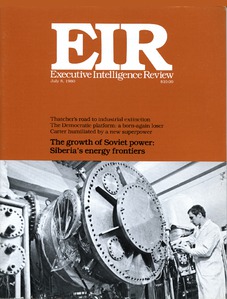Departments
Middle East Report
by Robert Dreyfuss
The Persian Gulf: a new Vietnam?
Dateline Mexico
by Josefina Menendez
Banking potentates come under fire.
Campaign 1980
by Kathleen Murphy
Congressional Calendar
by Barbara Dreyfuss and Susan Kokinda
Energy Insider
by William Engdahl
A matter of emphasis.
Facts Behind Terror
by Jeffrey Steinberg
LAPD under attack.
Editorial
The alliance after Venice.
Economics
Unfinished Business at the Venice Summit
by Alice Roth
The Franco-German faction seemed to do well politically at the Venice summit, but they conceded to the United States on Malthusian economic proposals which could undermine even their best political efforts.
Foreign Exchange
A Soviet Endorsement for the European Monetary System
by Clifford Gaddy
International Credit
by Renée Sigerson
New strategies for petrodollars.
Trade Review
Domestic Credit
by Lydia Schulman
What kind of recovery?
Agriculture
by Susan B. Cohen
A bonanza for the grain companies.
Thatcher’s Road to Industrial Extinction
The medievalist Sir Keith Joseph is to the British industrial economy what St. George was to the dragon-he’s killing it. A complete economic profile.
A ‘New Industries’ Plan: Deindustrializing Great Britain
by Luba George
The Industry Slayer: The ‘Exhilarating Mission’ of Sir Keith Joseph
by David Goldman
Business Briefs
Special Report
The Rise of Soviet Power: Siberia’s Energy Frontiers
by Rachel Douglas
Even as America cuts research, eliminates industry, and phases out nuclear power, the Soviet Union under the prevailing influence of successful Siberian development planners is pushing ahead with its nuclear program, reforming industrial management to optimize growth, and pushing forward the frontiers of science.
The New Five-Year Plan – The Oil of Siberia – A Siberian Proposal for Industry Reform – Science and Novosibirsk – The Nuclear Program – World Energy Solutions – The Great Atommash – Kirilenko’s Future for Energy.
International
France, Germany Take Charge of Soviet Relations
by Vivian Zoakos
Jimmy Carter, thinking to bludgeon the continental powers away from detente, found himself discredited, dressed-down and out-maneuvered by Giscard and Schmidt at the Venice summit meeting. He also found himself officially conceding authority over East-West relations.
General Nino Pasti: Euromissiles Mean War
An exclusive interview with the former Italian NATO commander, on nuclear-force modernization, the China card, and Iran.
Argentina Marries Brazil
by Mark Sonnenblick
Seemingly miraculous, enemies for 40 years have become close allies–and plan to become the equivalent of NATO in Latin America, and arms salesmen to the world.
The Rise of Fascism in Israel
by Mark Burdman
Analysis of the great new threat in the Middle East.
International Intelligence
National
The Democratic Platform: A Born-Again Loser
by Barbara Dreyfuss
The Carter White House handpicked the committee, and railroaded through a party platform so bad it makes Carter’s present policies look good. Not a Democrat can be found who thinks it can be sold to the voters, almost as if the purpose were to destroy the Democratic Party.
Texans Rise Against Carter on Farm Issue
by Vin Berg
The Texas Democratic convention, though dominated by Carter delegates, demanded 90 percent parity for farmers, and nearly demanded an open Democratic convention. It was a victory for LaRouche. Included: The dark horse candidate’s speech to the convention.
National News



